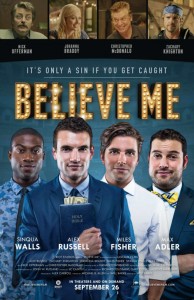 Believe Me
Believe Me
Starring Alex Russell, Zachary Knighton, Johanna Brady, Max Adler, and Christopher McDonald
Directed by Will Bakke
Rated PG-13
Run Time: 93 minutes
Genre: Comedy/Drama
Opens September 26th
By Eric Forthun of Cinematic Shadows
Films that aim to tackle religion comedically and from multiple viewpoints often lose themselves on their journey. Believe Me, unfortunately, falls into that trap of being aggressively against religion while simultaneously crafting kind, likable characters within religion. That makes for an uncomfortable dichotomy that grows from the central characters conning religious believers for personal gain. While atheists may revel in the susceptibility of religious characters to believe anything, the film presents the college seniors at the heart of the film as arrogant, self-involved pricks. Not exactly the best dynamic. The film focuses on Sam (Alex Russell), a student that loses his scholarship for the semester after realizing that he has yet to pay for summer classes, leading to financial ruin. He can think of no alternatives or solutions, considering dropping out of school rather than find a way to make money.
And then it clicks. He sees the success that churches have with raising money for mission trips and good causes, discovering that in a conversation with a church-going girl that details how it's difficult to track money when accrued like that. He figures they can do one fundraiser for helping kids in Africa (as if that already wasn't a clichéd, privileged concept) and pocket almost all of the money. But afterwards, they are approached by members of one of the biggest religious groups in the United States to go on tour across the country. Most of Sam's friends are reluctant, with Pierce (Miles Fisher) standing opposed only until he finds out that money is involved. Tyler (Sinqua Walls) thinks it's immoral but doesn't want to lose his friends, while Baker (Max Adler) plays along because he's there for the ride. Sam's also driven by his lust for one of the organization's leaders, Callie (Johanna Braddy), who unfortunately is tied to Gabriel (Zachary Knighton), a musician that leads the church's band.
The film is sprinkled with comedic supporting actors, with Nick Offerman shining terrifically as Sam's financial/academic advisor. His solemn advice on life is hilariously delivered and oddly misplaced in a film that doesn't carry the same style of humor. Christopher McDonald plays the organization's leader that wants them to be the best they can; he's an honorable, decent man that never fits the stereotype of a comedic fool within religion. It's a relief considering much of the film acts as a group therapy session for bashing religion and the gullibility of its members. I'm not a religious man myself, and I didn't disagree with many of the things that the main characters preach about religion. But when the faith within the film itself isn't mean-spirited and isn't harming anyone, then why is it something to mock? It undermines the film's focal argument by insisting that these characters are committing corrupt actions but that they are justified due to the fallibility of religion.
Believe Me doesn't say all that much about religion itself. There's a surprisingly intimate scene late in the film between Sam and Callie, discussing the nature of his business and just how malevolent and awful he is. It's rare these days to see films address their antiheroes with such candor, yet in doing so reminds us of just how unlikable the protagonists are. There's nothing particularly charming about their actions because most of the film involves them wallowing in the money they've stolen from good individuals. Religious characters are treated as the level-minded, guilt-free individuals, another compelling characterization due to the way that cinema traditionally lambasts religion. Yet the narrative never works with Believe Me's message, particularly when the story gets familiarly messy and has every character discover everything about everyone. There's a certain intrigue behind the film's portrayal of religion, but the story falls flat and uses malice as its lead voice.









